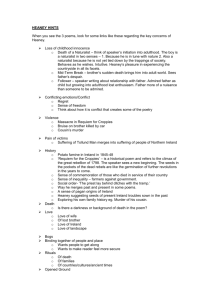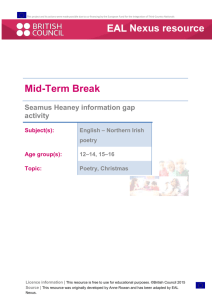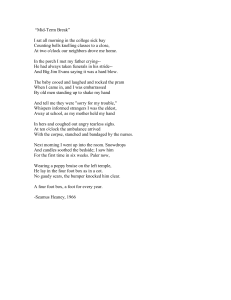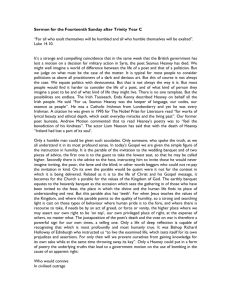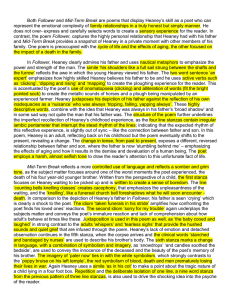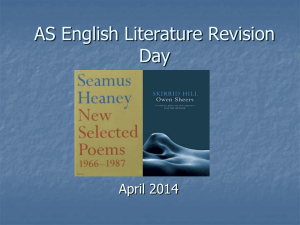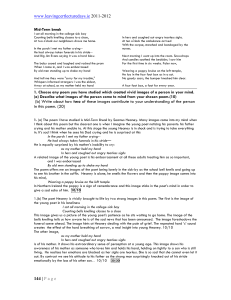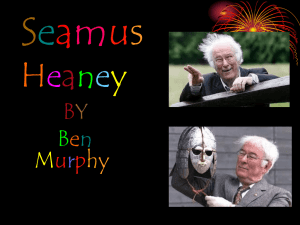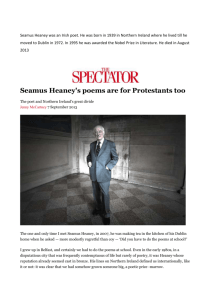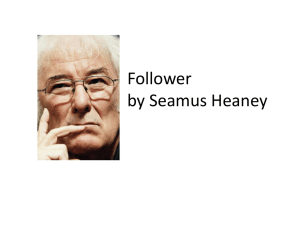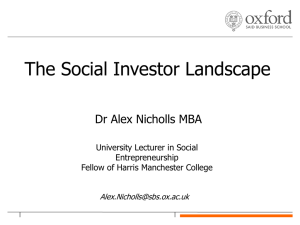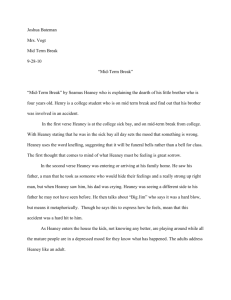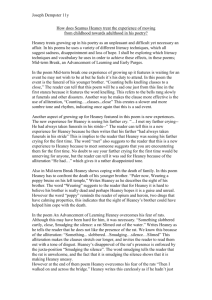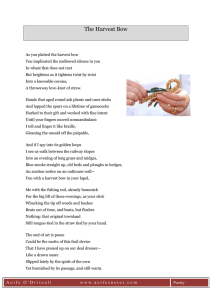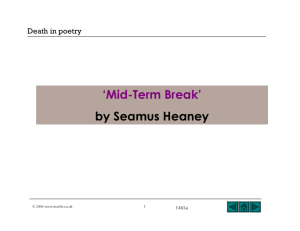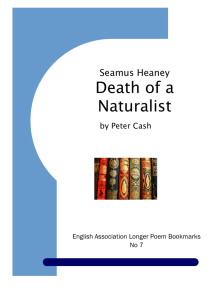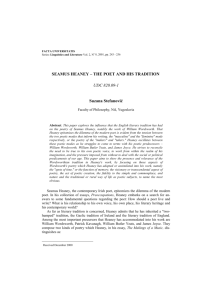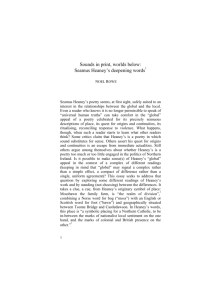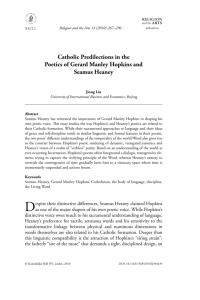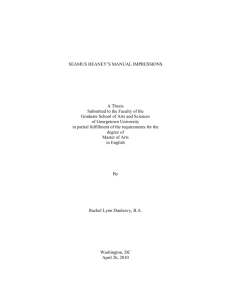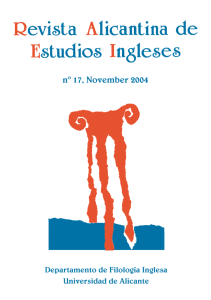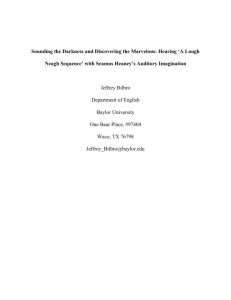ADDITIONAL NOTES ON HEANEY – FOR PART 2
advertisement
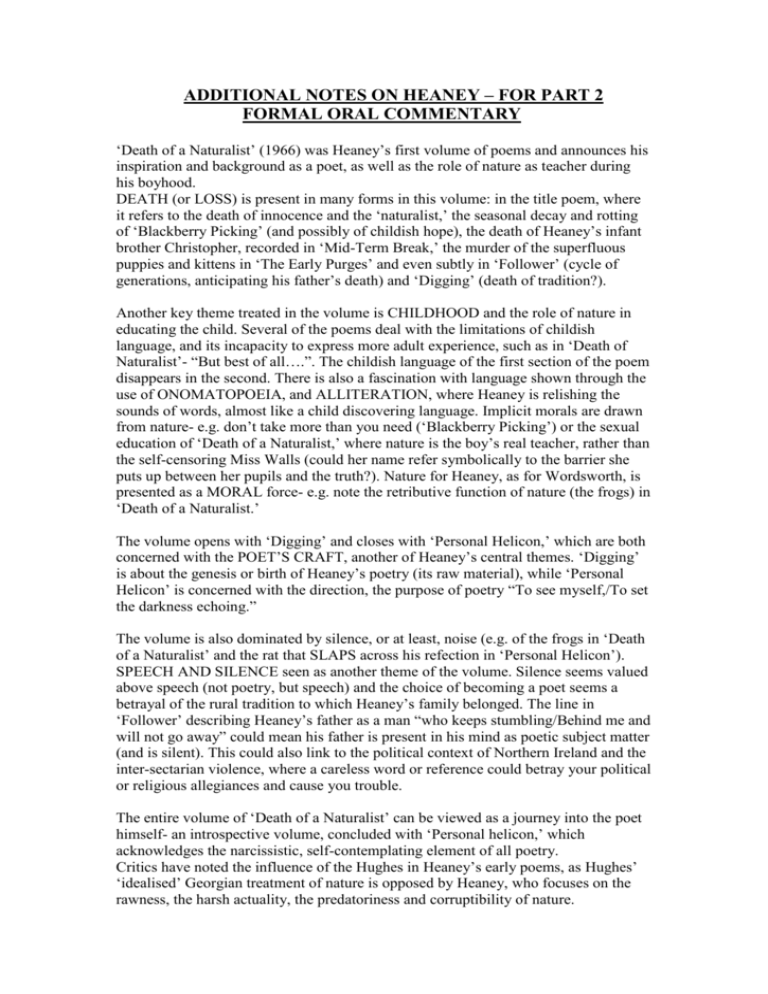
ADDITIONAL NOTES ON HEANEY – FOR PART 2 FORMAL ORAL COMMENTARY ‘Death of a Naturalist’ (1966) was Heaney’s first volume of poems and announces his inspiration and background as a poet, as well as the role of nature as teacher during his boyhood. DEATH (or LOSS) is present in many forms in this volume: in the title poem, where it refers to the death of innocence and the ‘naturalist,’ the seasonal decay and rotting of ‘Blackberry Picking’ (and possibly of childish hope), the death of Heaney’s infant brother Christopher, recorded in ‘Mid-Term Break,’ the murder of the superfluous puppies and kittens in ‘The Early Purges’ and even subtly in ‘Follower’ (cycle of generations, anticipating his father’s death) and ‘Digging’ (death of tradition?). Another key theme treated in the volume is CHILDHOOD and the role of nature in educating the child. Several of the poems deal with the limitations of childish language, and its incapacity to express more adult experience, such as in ‘Death of Naturalist’- “But best of all….”. The childish language of the first section of the poem disappears in the second. There is also a fascination with language shown through the use of ONOMATOPOEIA, and ALLITERATION, where Heaney is relishing the sounds of words, almost like a child discovering language. Implicit morals are drawn from nature- e.g. don’t take more than you need (‘Blackberry Picking’) or the sexual education of ‘Death of a Naturalist,’ where nature is the boy’s real teacher, rather than the self-censoring Miss Walls (could her name refer symbolically to the barrier she puts up between her pupils and the truth?). Nature for Heaney, as for Wordsworth, is presented as a MORAL force- e.g. note the retributive function of nature (the frogs) in ‘Death of a Naturalist.’ The volume opens with ‘Digging’ and closes with ‘Personal Helicon,’ which are both concerned with the POET’S CRAFT, another of Heaney’s central themes. ‘Digging’ is about the genesis or birth of Heaney’s poetry (its raw material), while ‘Personal Helicon’ is concerned with the direction, the purpose of poetry “To see myself,/To set the darkness echoing.” The volume is also dominated by silence, or at least, noise (e.g. of the frogs in ‘Death of a Naturalist’ and the rat that SLAPS across his refection in ‘Personal Helicon’). SPEECH AND SILENCE seen as another theme of the volume. Silence seems valued above speech (not poetry, but speech) and the choice of becoming a poet seems a betrayal of the rural tradition to which Heaney’s family belonged. The line in ‘Follower’ describing Heaney’s father as a man “who keeps stumbling/Behind me and will not go away” could mean his father is present in his mind as poetic subject matter (and is silent). This could also link to the political context of Northern Ireland and the inter-sectarian violence, where a careless word or reference could betray your political or religious allegiances and cause you trouble. The entire volume of ‘Death of a Naturalist’ can be viewed as a journey into the poet himself- an introspective volume, concluded with ‘Personal helicon,’ which acknowledges the narcissistic, self-contemplating element of all poetry. Critics have noted the influence of the Hughes in Heaney’s early poems, as Hughes’ ‘idealised’ Georgian treatment of nature is opposed by Heaney, who focuses on the rawness, the harsh actuality, the predatoriness and corruptibility of nature.
